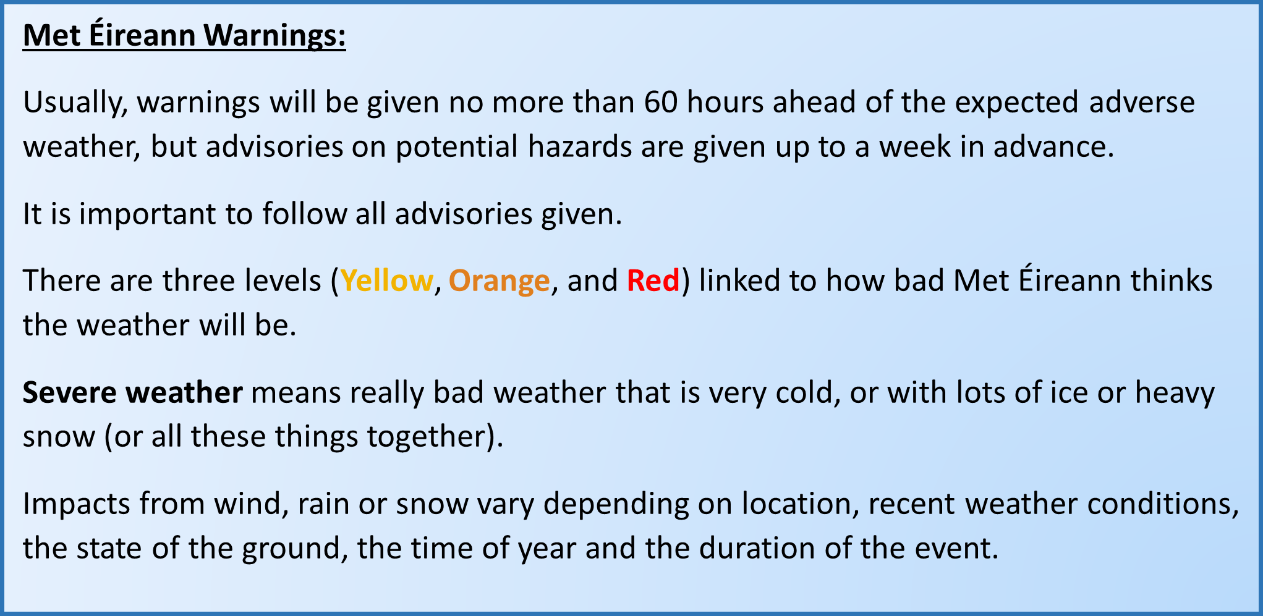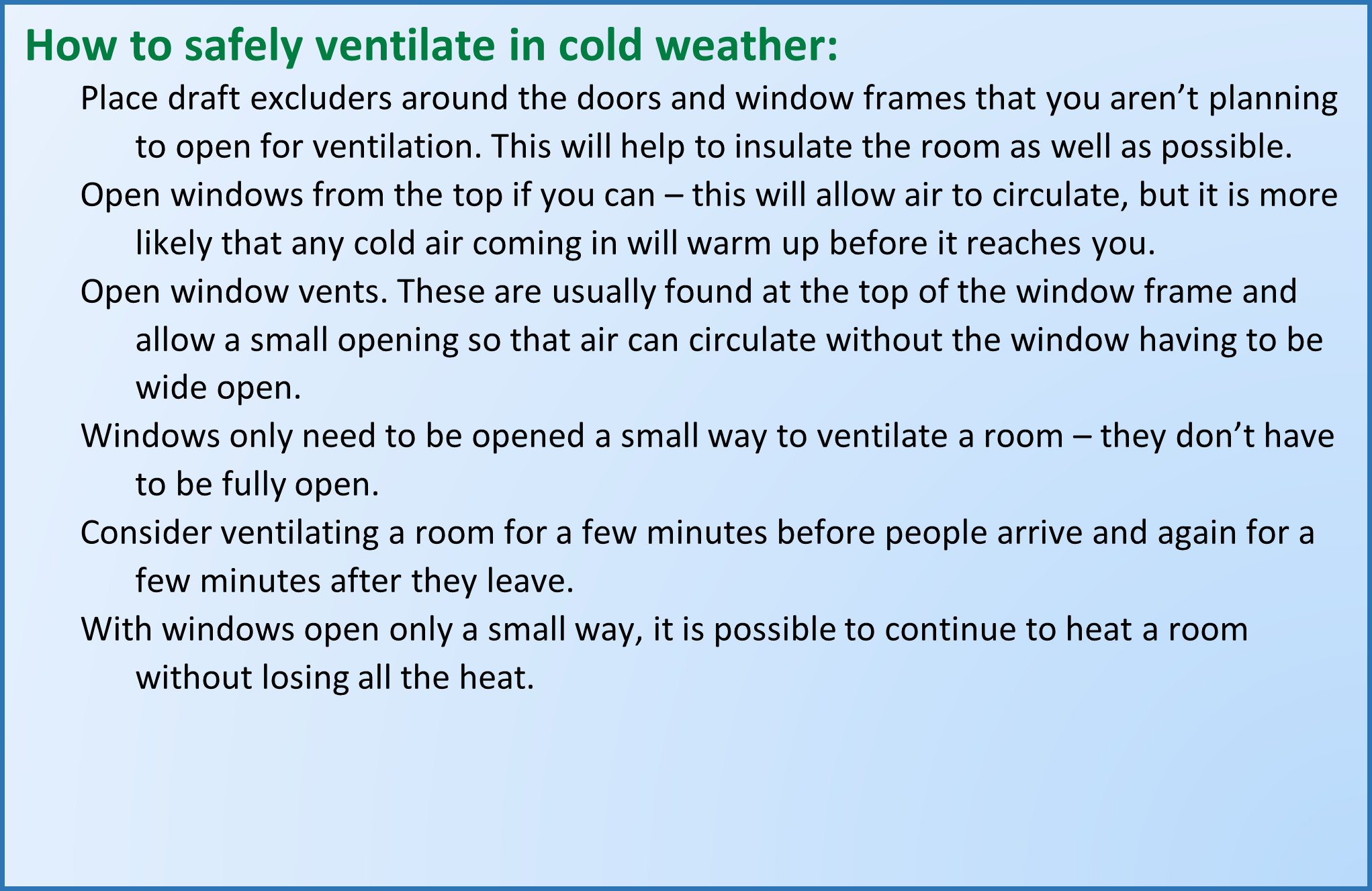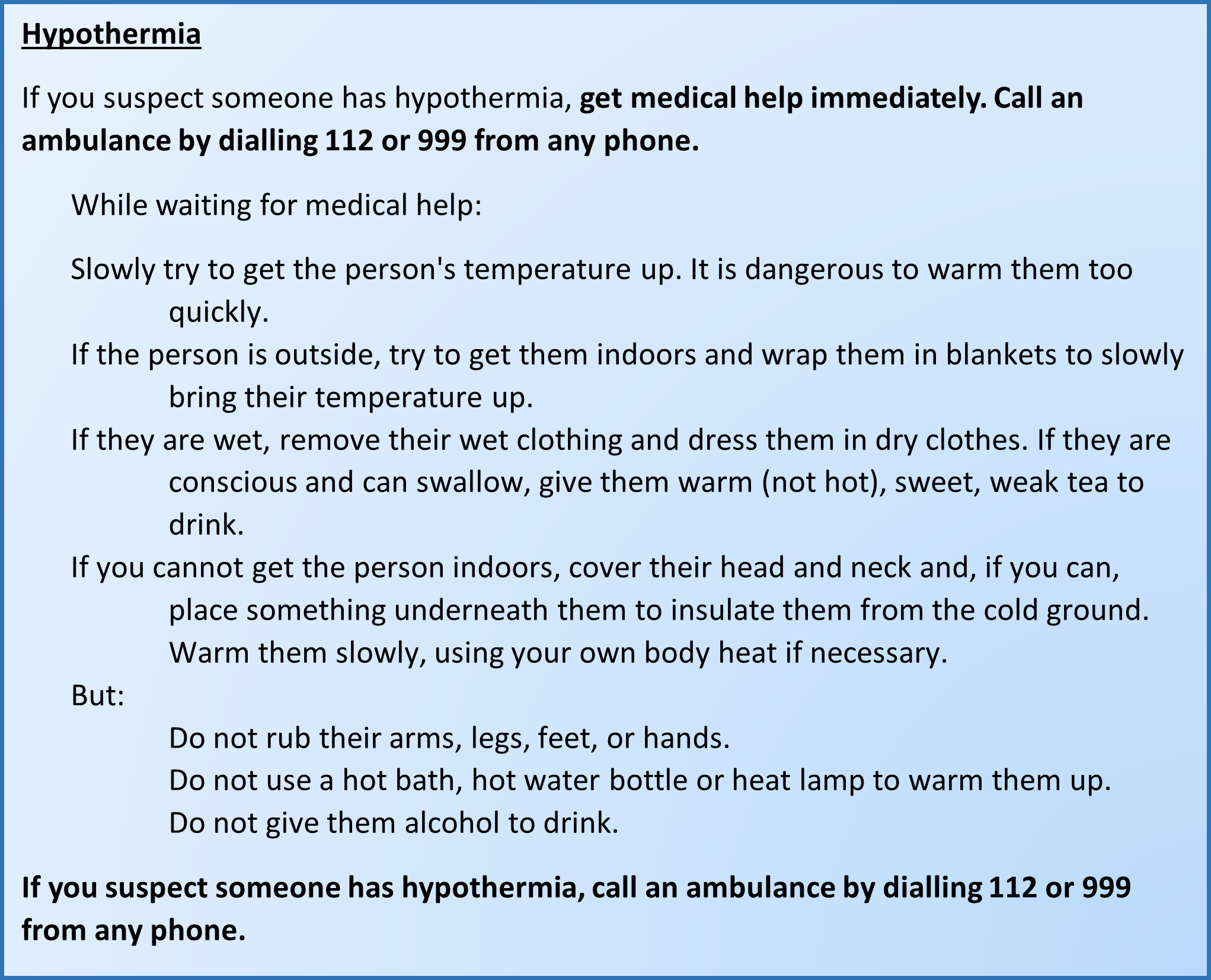Cold Weather Advice for the General Public
Overview
Cold weather can have adverse impacts on our health including hypothermia, the dangers of icy conditions, risks of carbon monoxide poisoning, and heightened exposure to winter viruses. The advice provided in the following sections should act as a guide to help you stay safe during the cold weather. Further advice is available on the HSE website. In addition, Met Éireann provide up-to-date forecast information and issue warnings for predicted cold snaps. The Government’s Be Winter Ready campaign provides advice on how to prepare for winter.

The negative health effects of cold weather start at temperatures of 4-8°C (39 - 46°F) or below. Colder temperatures can cause a range of health problems:
- Can affect your body’s ability to fight off viruses and other infections. The body is not as effective at fighting a virus when cold air enters the nose and upper airways, so viruses such as the common cold, the flu and COVID-19 often spread more easily in the winter.
- Can worsen underlying health conditions such as heart and lung disease.
- Can increase the risk of a heart attack, stroke, falls, injuries, and hypothermia.
- Also associated with an increased risk of mental health problems, such as depression and anxiety.
You’re at greater risk of illness in cold weather if you:
- are aged over 65
- are under the age of 5
- have a long-term health condition such as heart, lung or kidney disease
- have a disability
- are struggling to afford heating
- are homeless or sleeping on the streets
Get Vaccinated
It is especially important to get vaccinated for Flu, COVID-19, and Pneumococcus ahead of the winter months.
Flu vaccine
Getting the flu vaccine is the best way to protect you against flu.
You can get a free flu vaccine if you are:
- aged 65 years and older
- aged 2 to 17 years
- a healthcare worker
- pregnant
- living in a nursing home or other long-term care facility
- in regular contact with pigs, poultry, or waterfowl
- someone with a health condition that puts you at higher risk of flu
- living with someone who has a health condition that puts them at higher risk of flu
- a carer for someone who has a health condition that puts them at higher risk of flu
The best time to get your flu injection is in September or October. But if you missed it then, make sure to get it as soon as you can.
COVID-19 vaccine
You should also ensure that you are up to date with your COVID-19 vaccinations.
Pneumococcal vaccine
Pneumococcal vaccination is recommended for those over aged 65 and those with certain chronic health conditions. See the HSE website for further information on the benefits of vaccination against pneumococcal disease.
Safe Room Ventilation During Cold Weather
When it’s cold outside we tend to keep our windows closed more to keep the heat in. Ventilation, however, remains very important even during cold weather. With low temperatures we use more heating devices and some of these (especially older models) can create carbon monoxide, which can be extremely dangerous. It’s still possible to ventilate a room while heating it by following the advice below. Another reason it’s important to continue ventilation is to reduce the risk of transmission of viruses, including COVID-19 and flu.

By following these tips, you can keep yourself and your home as warm as possible while allowing for safe ventilation at the same time.
Staying Warm: Keep Yourself Warm
- It is best to avoid getting too cold in the first place.
- Wear several layers of light clothes instead of one thick layer.
- Wear clothes made of wool or fleecy synthetic fibres (cotton is only effective if the clothes stay dry). Thermal underwear can be very effective.
- In very cold weather put extra blankets or duvets on your bed.
- Put on a coat, hat, scarf, gloves and warm shoes or boots when you go outside.
- Eating a healthy, balanced diet will help keep you warm and healthy in the winter. Make sure you and your family eat at least one hot meal a day and have plenty of hot drinks throughout the day.
- Avoid too much alcohol or caffeine.
- Listen to or watch the weather forecast and don’t go out in extreme weather if possible.
- Keep active indoors. Moving around will help keep you warm.
Staying Warm: Keep Your Environment Warm
Research shows that cold homes have a negative impact on health and wellbeing:
- Keep the rooms you spend most of your time in warm. This is especially important for infants, the elderly or those with chronic health conditions.
- Ideally all rooms used during the day should be heated:
- living room to around 18-21°C (65-70°F)
- the rest of your house to at least 16°C (61°F).
- If you can’t heat all your rooms, make sure that you keep one room warm throughout the day.
- Close doors to separate heated areas from unheated areas of your home
- Use draught excluders to stop draughts around doors, windows, and skirting boards.
- Never block wall vents as they are essential for good air quality in your home.
Carbon Monoxide Poisoning
Carbon monoxide poisoning can be fatal, so if you have a natural gas or oil boiler, solid fuel fire, gas fire or standalone gas heater:
- Check all air vents around the home to make sure they are not blocked.
- Install carbon monoxide alarms - visit carbonmonoxide.ie for helpful information and advice.
- Remember alarms should also be fitted in caravans, boats, garages, and any other location where fuel is burned, or generators are in use.
See advice on how to safely ventilate your home during cold weather.
- If using a stove or open fire:
- Always guard open fires with a spark-guard and a fireguard secured to the wall.
- Cover stoves with a fireguard secured to the wall.
- Never put anything on top of a fireguard.
- Ensure chimneys are clean and visit www.dublincity.ie for advice from Dublin Fire Brigade about how to avoid chimney fires.
- Keep portable heaters away from curtains and blinds as they could catch fire.
- Make sure you have working smoke alarms and test them regularly.
- In very cold weather, instead of turning the thermostat up, set the heating to come on earlier so you won’t be cold while you wait for your home to heat up. See the SEAI website for energy saving tips and advice and supports to help you keep warm.
- If you use an electric blanket:
- Check what type it is - some are designed only to warm the bed before you get in and should not be used throughout the night.
- Do not use damaged electric blankets in your home - check electric blankets and their flexes regularly for signs of wear and tear.
- Make sure there are no creases in the electric blanket, and it lies flat on the mattress.
- Never use an electric blanket and hot water bottle together as it could cause electrocution.
- If you suffer with incontinence, chat to your GP or Public Health Nurse before using an electric blanket.
Available Supports
If you are struggling to afford heating, ensure that you are on the vulnerable customer registers for the energy companies and Irish Water.
You may be entitled to a fuel allowance to help with the cost of heating your home during the winter months. Many people getting a social welfare payment will qualify for this allowance.
In addition, an expanded fuel allowance scheme for those aged over 70 was introduced in 2022. Under this scheme, the means-tested threshold has been reduced, meaning that more people will now qualify for additional energy supports. You can apply for this scheme here.
You may be entitled to a free or subsidised home energy upgrade through the SEAI.
Preparing for Cold Weather
Power cuts
The risk of power cuts or blackouts increases in winter. You should prepare yourself for a potential power cut:
- Have batteries for torches and alternative light sources in the event of power cuts.
- Keep a torch beside your bed and in your living room. Check the batteries regularly.
- Keep mobile phones charged up - have local emergency numbers in your phone.
- If you depend on medical equipment at home, such as such as home dialysis machine, a ventilator or an oxygen concentrator, make sure to register as a vulnerable customer with your electricity supplier. More information on how to register as a vulnerable customer can be found here.
Personal Safety
- Stock up on a small supply of non-perishable, easy-to-prepare foods like a carton of long life UHT milk, a loaf of bread in the freezer, and some tinned and dried foods.
- Keep extra supplies of essential medication in case it is difficult to get to the doctor or pharmacy.
- Have enough fuel for heating and cooking. And, if possible, have another suitable option in case your main supply fails.
- Know how to turn off your water supply in the event of a big freeze or snowstorm (to avoid leaks when the thaw comes). If your water supply is disrupted due to severe weather, you will find health advice on drinking water here.
- Try to have a water container available that you can fill with drinking water if needed.
- Consider buying salt to put on the footpaths near your home. Salt helps to melt ice.
- Have a suitable snow shovel for clearing snow.
- Get your vehicle serviced before winter sets in to make sure it is ready for bad weather (which often comes when you least expect it). See the Road Safety Authority (RSA) website for advice on vehicle maintenance and safety.
See the Government's be winter ready campaign for further advice on how to prepare for a predicted cold snap.
Preventing Falls and Trips
While both young and old present to Emergency Departments as a result of falls on ice, as we get older a fall can result in broken bones, a loss of confidence, and loss of mobility and fear of leaving the home. Our advice is to:
- Stay indoors, if possible, when the weather is bad.
- If you need to go outside in icy conditions, be extra careful and follow these tips from the Road Safety Authority:
- If a journey cannot be avoided walk on a footpath, not in the street. If there are no footpaths walk on the right-hand side of the road (towards oncoming traffic). Be extremely careful as frost, ice and snow will make walking on footpaths very dangerous.
- Remember that footpaths may not be treated so walk with extreme care, make sure you are wearing appropriate footwear (footwear with good grips and no high heels) and in extreme conditions consider an appropriate walking stick or walking pole.
- Avoid walking in the streets at all costs if possible. Remember, cars and trucks slip and slide, too! If it’s an emergency, and you can’t avoid the street, wear bright or reflective clothing.
- Visibility is reduced in snowy condition so wear high visibility clothing or carry a torch
- Wear clothing that does not restrict your vision. Stay warm, but DO NOT impair your vision with hoodies, ski masks, scarves, hats, etc. This type of clothing could prevent you from spotting icy conditions that may lead to a fall or not enable you to see a car that is spinning out of control.
- Snow and ice cause havoc quickly, so use extra caution when crossing roadways, and always cross at pedestrian crossings.
- Ice can easily hide under a light dusting of snow. Just because you don’t see the ice doesn’t mean it’s not there waiting for your unsuspecting footfalls.
- If you can’t avoid the ice and snow, bend your knees slightly and take slower, shorter steps to help reduce the chance of a slip and fall and an injury.
- If forced to use the steps at someone’s home, apartment, or other public building, walk slowly and take shorter steps when descending. The same is true of driveways and other hilly terrain; these areas can be very dangerous when they become slippery with ice or snow. Steps especially can be hard to clear and build up ice easily.
- Be aware of overhead hazards! Falling icicles and chunks of snow pose a serious risk. In extreme cold weather icicles can build up in size very quickly and are potentially lethal. Their size and dagger-like formation are extremely dangerous for pedestrians. Be aware of what’s happening above you and stay clear from the edges of buildings.
(The above 10 points are taken directly from the RSA's tips on how to avoid slips and falls on ice).
Staying Safe on the Road
The golden rule is to drive, cycle or walk with extreme care and caution and expect the unexpected.
The following advice will help reduce the risk of injury:
- Get your vehicle serviced before winter sets in to make sure it is ready for bad weather (which often comes when you least expect it). See the Road Safety Authority (RSA) website for advice on vehicle maintenance and safety.
- The RSA strongly recommends that motorists carry a number of essentials in the boot of their car all year round. These items should include:
- High visibility vest
- A working torch
- A hazard warning triangle
- De-icing equipment (for glass and door locks)
- First aid kit
- Blanket (to help keep you warm if your car breaks down in cold weather and you are waiting for help)
- No matter how short the car journey is, it is always a good idea to bring a warm coat and waterproof jacket with you in case of car breakdown.
- In severe weather conditions consider whether you really need to travel.
- Consider whether it’s possible to delay your trip until the weather and road conditions improve.
- If you absolutely need to travel, use public transport where available.
- If you really have to travel by car, check the weather forecast for the area you will be travelling in and make sure the route is passable before starting your journey.
- Be prepared for severe conditions and follow the advice from Road Safety Authority (RSA) on driving in severe weather.
Advice on Medications, Medical Appointments, and What to Do if Others Feel Unwell
Medications
- Keep extra supplies of essential medication in case it is difficult to get to the doctor or pharmacy.
- Store medicines at the recommended temperature (read the storage instructions on the packaging).
- Store medicines in their original containers or packaging and keep out of sight and reach of children.
Medical Appointments
- If travel services or roads are disrupted due to bad weather, you may need to change planned visits to hospital or other health centres for appointments. Even a planned operation may need to be changed.
- If severe disruption occurs, some health services may have to change their opening times.
- If you have a question about a planned appointment, phone the hospital or clinic that you are due to attend to check on any changes to services.
What to Do if You or Others Feel Unwell
As temperatures fall, emergency departments become busier and there are increased hospital admissions.
- Common illnesses like sore throats, colds, earaches and fevers in children can be managed at home without needing to go to a GP or Emergency Department for treatment.
- See the HSE website for tips on how to treat common illnesses at home.
- If you are worried about your health during a cold snap and feel you need treatment, contact your GP for advice.
- If you feel very unwell or have any unusual symptoms, you should attend your local emergency department.
- Know your EIRCODE so that emergency services can easily find you in an emergency.
Hypothermia
Hypothermia is a life-threatening lowering of core body temperature caused by exposure to extreme cold. Hypothermia happens when your body temperature drops below 35°C (95°F). It is a serious condition and requires immediate medical attention.
Here is what to look out for in yourself or others:
- not feeling cold, even when the temperature is low
- cold skin in areas normally covered by clothing, for example, tummy or armpits
- shivering
- drowsiness
- slurred speech
- slow breathing
- feeling unsteady when moving
- pale and puffy face
- feeling confused

Look out for Others
- In winter, it can be difficult to carry out day to day activities. It is even more difficult for older people and other vulnerable people.
- Make a special effort to keep in contact with their neighbours and relatives, particularly those living alone, those who are isolated, ill, disabled or very young.
- Try to call on elderly relatives and neighbours and ensure they have enough food and any prescription drugs they may need.
- Try to ensure that they have enough fuel to maintain adequate heating in their homes.
- If you have any concerns about someone who may be vulnerable, get the help of An Garda Síochána or local health and social services.
Last updated: 12 January 2024


